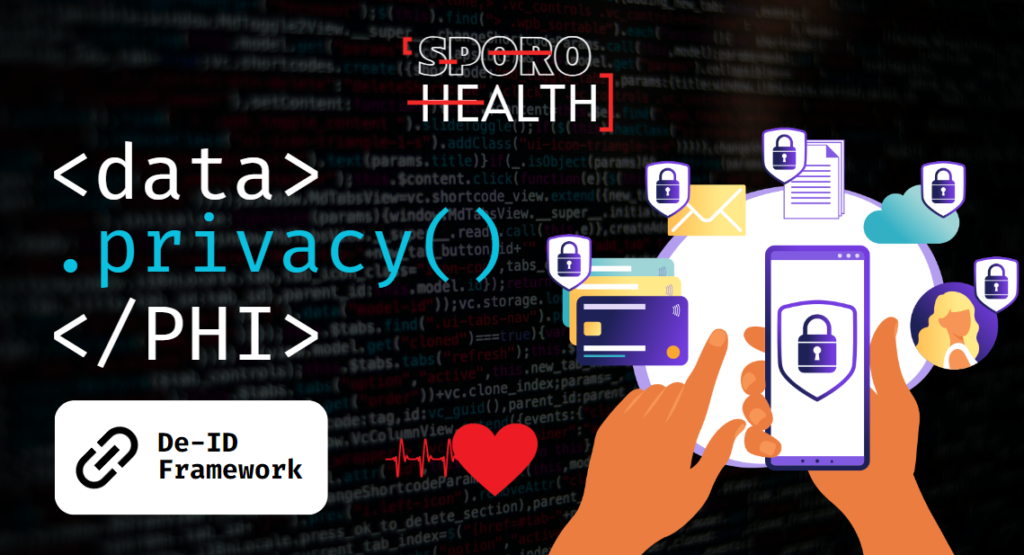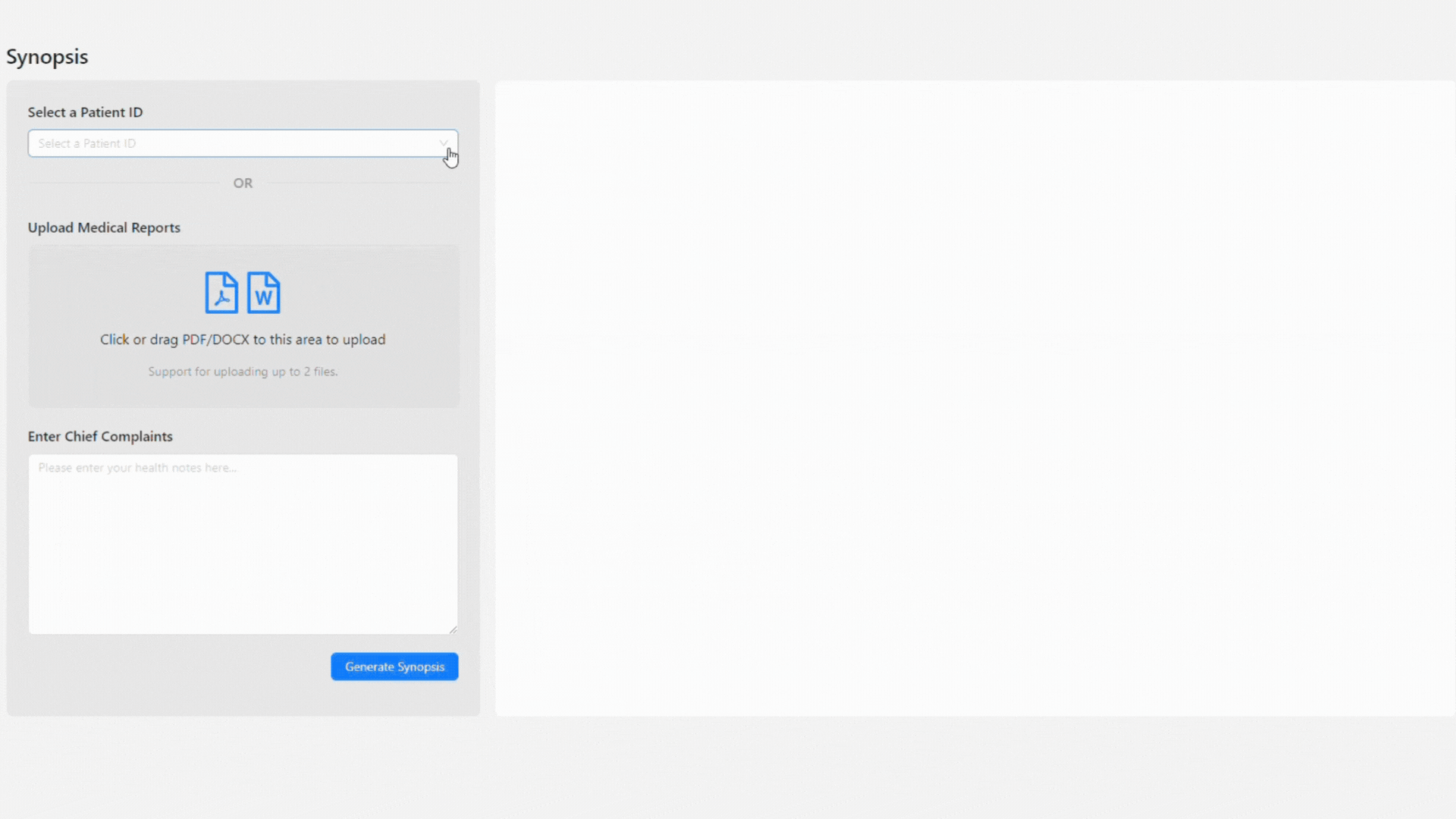Secure EHR Data Management with Sporo Health’s 1st Advanced De-Identification Framework

In today’s healthcare landscape, the security and management of Electronic Health Records (EHRs) are paramount. Sporo Health’s Advanced De-Identification Framework provides a robust solution for safeguarding sensitive patient data. This innovative framework, orchestrated by an AI agent, processes JSON data from EHR systems, ensuring that Protected Health Information (PHI) is securely de-identified and optimized for compliance. By leveraging cutting-edge technology, Sporo Health enables healthcare providers to maintain the highest standards of data privacy and security while streamlining their clinical workflows.
EHR systems often store patient data in unstructured formats, which can pose significant challenges for data management and security. Many leading EHR platforms, like Epic, utilize JSON schema to organize and manage this unstructured data. JSON (JavaScript Object Notation) is a lightweight data-interchange format that is easy for machines to parse and generate, making it ideal for handling complex patient information. By using advanced de-identification algorithms, Sporo Health ensures that even the most intricate data stored in EHR is protected while being used in any third party system. This approach not only enhances data security but also facilitates seamless integration and interoperability between different healthcare systems, enabling providers to deliver more efficient and effective patient care.
Table of Contents
Importance of De-Identifying Sensitive Patient Data in EHR Systems
In the realm of healthcare, ensuring that sensitive patient data within EHR is properly de-identified is essential. De-identification is the process of removing or obscuring personal information that could potentially identify patients, thus protecting their privacy. This step is crucial for compliance with regulations such as HIPAA, which mandates strict guidelines for the handling of Protected Health Information (PHI).
The 18 HIPAA identifiers that must be removed include names, geographic subdivisions smaller than a state, all elements of dates (except year), telephone numbers, fax numbers, email addresses, Social Security numbers, medical record numbers, health plan beneficiary numbers, account numbers, certificate/license numbers, vehicle identifiers and serial numbers, device identifiers and serial numbers, web URLs, IP addresses, biometric identifiers, full-face photographs and any comparable images, and any other unique identifying number, characteristic, or code.
Effective de-identification not only safeguards patient privacy but also enables the safe use of healthcare data for research and analytics. By de-identifying data, healthcare organizations can share valuable insights without compromising patient confidentiality. This practice supports advancements in medical research, improves patient outcomes, and facilitates data-driven decision-making in clinical settings.
Sporo Health’s Advanced De-Identification Framework
Sporo Health employs a cutting-edge de-identification framework powered by Natural Language Processing (NLP) and Machine Learning (ML) algorithms. These proprietary algorithms are designed to identify and mask Protected Health Information (PHI) within unstructured data formats such as JSON. By using sophisticated matching engines, Sporo Health ensures that patient data is anonymized without losing its clinical value. For example, real-world patient records involving complex medical histories are processed to strip identifiable information while preserving the essential details needed for research and analysis, thereby maintaining patient privacy and data utility.
Example Before and After De-Identification:
Before De-Identification:
{
"patient_id": "12345",
"name": "John Doe",
"dob": "1985-05-15",
"address": "123 Main St, Springfield, IL",
"phone": "555-123-4567",
"email": "john.doe@example.com",
"medical_history": [
{
"date": "2023-01-20",
"condition": "Hypertension",
"treatment": "Medication A"
},
{
"date": "2022-12-15",
"condition": "Diabetes",
"treatment": "Insulin"
}
]
}
After De-Identification:
{
"patient_id": "anon-12345",
"name": "REDACTED",
"dob": "REDACTED",
"address": "REDACTED",
"phone": "REDACTED",
"email": "REDACTED",
"medical_history": [
{
"date": "2023-01-20",
"condition": "Hypertension",
"treatment": "Medication A"
},
{
"date": "2022-12-15",
"condition": "Diabetes",
"treatment": "Insulin"
}
]
}
Process Overview:
- Data Retrieval: Patient data is pulled from the EHR system via an API.
- NLP and ML Processing: The framework scans the JSON data, identifying PHI elements such as names, dates of birth, addresses, phone numbers, and email addresses.
- De-Identification: The identified PHI elements are masked or replaced with generic placeholders (e.g., “REDACTED” or “anon-12345”).
- Data Utility Preservation: Non-identifiable data, such as medical history and treatment details, remains intact to ensure the data retains its clinical and research value.
This de-identification process allows healthcare organizations to utilize patient data for analytics, research, and reporting without compromising patient privacy.
Ensuring PHI Compliance and Data Privacy
Compliance with regulations such as HIPAA is a cornerstone of Sporo Health’s operations. The advanced de-identification framework not only anonymizes patient data but also ensures that all processed information meets stringent privacy standards. This involves rigorous auditing, encryption of data both in transit and at rest, and continuous monitoring for potential breaches. By adhering to these protocols, Sporo Health guarantees that all patient information remains confidential and secure.
Enhancing Clinical Workflows with SPORO’s Synopsis Feature
Sporo Health enhances clinical workflows through its innovative synopsis feature, which quickly generates concise and accurate summaries of patient records. By leveraging AI agents and LLMs, Sporo can analyse extensive patient data, including clinical notes and history, to produce a streamlined synopsis that healthcare providers can review in seconds.
This feature significantly reduces the time clinicians spend on administrative tasks, allowing them to focus more on patient care.
Conclusion
In conclusion, Sporo Health’s advanced de-identification framework and innovative tools significantly enhance the security, compliance, and efficiency of EHR data transfer and processing for insights generation. By ensuring PHI compliance and leveraging sophisticated algorithms, Sporo Health not only protects patient data but also streamlines clinical workflows, ultimately improving healthcare delivery and patient care.
FAQs
How is sensitive patient data de-identified in EHR systems?
Sporo Health uses advanced NLP and ML algorithms to identify and mask PHI within unstructured data formats like JSON, ensuring patient data is anonymized while retaining clinical value.
What specific information needs to be de-identified to comply with HIPAA?
Sporo Health’s framework targets the 18 HIPAA identifiers, including names, addresses, dates, phone numbers, email addresses, and other unique identifiers to ensure compliance and privacy.
How do de-identification frameworks integrate with existing EHR systems?
Sporo Health’s framework integrates seamlessly with various EHR systems through APIs, allowing for efficient data processing and de-identification without disrupting existing workflows.
What are the benefits of using a de-identification framework in healthcare?
Using Sporo Health’s framework ensures HIPAA compliance, enhances data security, and allows for the safe use of de-identified data in research and analytics, ultimately improving patient care and outcomes.


[…] implement AI in their practice, they must prioritize data security. The chosen company should have de-anonymization frameworks in place, avoid third-party software, and be trusted for their technical capabilities. Choosing […]